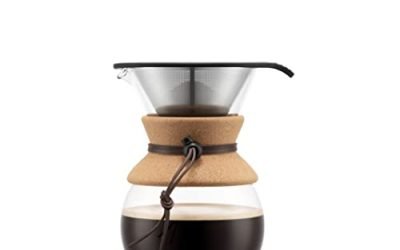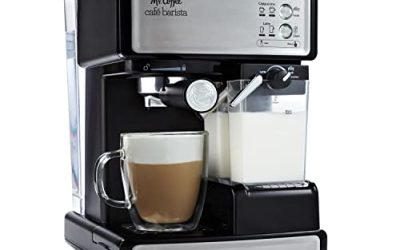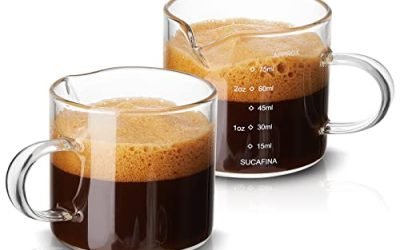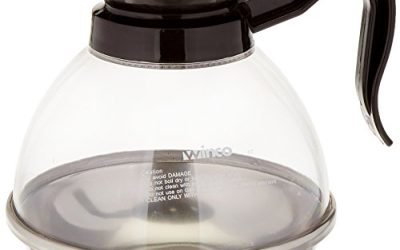Hey there, coffee lovers! Have you ever wondered why your morning cup of joe tastes so good? Well, it’s not just the beans and the brewing method that make all the difference – the humble coffee filter plays a crucial role too. Today, we’re diving into the fascinating world of coffee filters and uncovering the science behind their importance in the brewing process. So grab a fresh brew, get cozy, and let’s learn together about the magic happening inside that filter. You’ll never look at your morning coffee the same way again!
Get brewing with these top-rated coffee filters!
What are coffee filters?
Coffee filters are an essential tool for anyone who enjoys a good cup of joe. They play a crucial role in the brewing process by separating the coffee grounds from the liquid, resulting in a smooth and flavorful cup of coffee. In this blog section, we’ll dive into the world of coffee filters, exploring the different types available and their unique characteristics.
Paper Filters
Description: Paper filters are the most commonly used coffee filters. They are made from porous paper that allows water to flow through while retaining the coffee grounds.
Benefits:
- Easy to use and dispose of.
- Available in various sizes to fit different coffee makers.
- Can enhance the taste of your coffee by removing oils and sediment.
Example: Melitta Natural Brown Coffee Filters
Metal Filters
Description: Metal filters are a popular alternative to paper filters. They are typically made from stainless steel and have a fine mesh that traps the coffee grounds while allowing the liquid to pass through.
Benefits:
- Environmentally friendly as they can be reused.
- Retain more of the coffee’s natural oils, resulting in a richer and fuller flavor.
- Durable and long-lasting.
Example: Able Brewing Disk Fine Coffee Filter
Cloth Filters
Description: Cloth filters, also known as reusable filters, are made from fabric materials such as cotton or hemp. These filters are placed in a brewing device and require regular cleaning and maintenance.
Benefits:
- Environmentally friendly and cost-effective in the long run.
- Allow more of the coffee’s natural oils and flavors to pass through, resulting in a robust cup of coffee.
- Can be used for various brewing methods, including pour-over and French press.
Example: CoffeeSock Organic Cotton Filter
Choosing the Right Coffee Filter
When selecting a coffee filter, there are a few factors to consider:
- Brewing Method: Different filters are designed for specific brewing methods, so choose one that suits your preferred method, whether it’s a drip machine, pour-over, or French press.
- Filter Size: Ensure that the filter size matches your coffee maker to ensure a proper fit and optimal brewing.
- Flavor Preference: Paper filters tend to produce a cleaner cup of coffee, while metal and cloth filters allow more oils and flavors to pass through. Consider your preference for a lighter or bolder taste.
- Environmental Impact: If sustainability is important to you, opt for reusable metal or cloth filters that can be washed and reused instead of single-use paper filters.
How do coffee filters work?
If you’re a coffee lover, you’ve probably used a coffee filter countless times without giving it much thought. But have you ever wondered how these simple paper filters actually work their magic? In this article, we’ll dive into the science behind coffee filters and explore how they help create that delicious cup of joe.
The Purpose of Coffee Filters
Coffee filters serve a crucial role in the brewing process by separating the coffee grounds from the liquid, allowing you to enjoy a smooth and sediment-free cup of coffee. They act as a physical barrier, keeping the grounds contained while allowing the liquid to pass through. Without a coffee filter, your morning brew would be filled with unwanted debris, making it a gritty and unappealing experience.
Types of Coffee Filters
There are various types of coffee filters available on the market, and each has its own unique characteristics. Let’s take a closer look at two popular options:
1. Paper Filters
Paper filters are the most commonly used type and are often found in drip coffee makers. They are made from porous paper material that is capable of trapping even the finest coffee grounds. Here’s how they work:
- The fine pores in the paper filter allow the liquid (coffee) to pass through while capturing the larger coffee particles.
- As the hot water comes into contact with the coffee grounds, it extracts the flavor and oils, turning into the delicious coffee we know and love.
- The liquid then drips through the paper filter, leaving the grounds behind and resulting in a smooth cup of coffee.
Paper filters have the added advantage of absorbing some of the oils and fats present in the coffee, which can contribute to a cleaner taste.
2. Mesh Filters
Mesh filters, often made of stainless steel or nylon, have gained popularity in recent years. They offer a reusable and environmentally friendly alternative to paper filters. Here’s how they work:
- Mesh filters have finer holes compared to paper filters, allowing the liquid to flow through while still capturing smaller coffee particles.
- These filters are designed to be durable and long-lasting, eliminating the need for constant replacement.
- Some mesh filters are even built with a double layer or additional mesh to ensure a thorough filtration process.
Mesh filters are a great option for those who prefer a more robust and full-bodied cup of coffee, as they allow more oils and flavors to pass through compared to paper filters.
Benefits of Coffee Filters
Now that we understand how coffee filters work, let’s explore some of the benefits they offer:
- Improved Taste: By keeping the coffee grounds separate from the liquid, filters prevent the bitter and gritty elements from entering your cup, resulting in a cleaner and smoother taste.
- Sediment-Free Brew: Coffee filters ensure that you can enjoy your coffee without any unwanted particles or debris floating around, enhancing the overall drinking experience.
- Easy Cleanup: With disposable paper filters, cleaning up after brewing is a breeze. Simply remove the used filter, along with the coffee grounds, and toss it away.
- Environmental Consciousness: For those who prefer reusable options, mesh filters offer an eco-friendly choice by reducing waste and the need for constant replacement.
Types of coffee filters
Coffee filters play a crucial role in the brewing process, helping to extract the delicious flavors and aromas from your beans while keeping unwanted particles out of your cup. With so many options available, it can be overwhelming to choose the right one for your brewing preferences. In this article, we’ll explore the different types of coffee filters, their benefits, and their drawbacks, so you can make an informed decision.
1. Paper Filters
Benefits:
- Excellent filtration: Paper filters are designed to trap even the finest particles, resulting in a clean and smooth cup of coffee.
- Convenience: They are widely available and come in various sizes to fit different coffee makers.
- Easy cleanup: Paper filters are disposable, making cleanup a breeze.
Drawbacks:
- Potential flavor alteration: Some coffee enthusiasts argue that paper filters can absorb some of the coffee oils and remove desirable flavors.
- Environmental impact: As disposable filters, they contribute to waste generation.
One popular brand of paper filters is Melitta, known for their high-quality filters that deliver a clean and flavorful brew.
2. Metal Filters
Benefits:
- Full-bodied coffee: Metal filters, such as stainless steel mesh filters, allow more oils and sediment to pass through, resulting in a richer and fuller-bodied cup of coffee.
- Reusable: Metal filters are a sustainable option as they can be cleaned and reused, reducing waste.
Drawbacks:
- Potential sediment in the cup: Due to their coarser filtration, metal filters may allow some sediment to pass through, which can be off-putting for some coffee drinkers.
- Cleaning can be tricky: Metal filters require thorough cleaning to prevent buildup and maintain optimal performance.
Brands like Able Brewing and Frieling offer high-quality metal filters that are compatible with various coffee makers.
3. Cloth Filters
Benefits:
- Reusability: Cloth filters are eco-friendly alternatives as they can be washed and reused multiple times.
- Unique flavor profile: Cloth filters can impart a subtle flavor to the coffee, enhancing its overall taste.
Drawbacks:
- Regular maintenance: Cloth filters need to be properly cleaned and dried after each use to prevent mold or mildew growth.
- Potential staining: Over time, cloth filters may develop stains that can be challenging to remove completely.
One well-known cloth filter brand is CoffeeSock, which offers durable and reusable filters that are suitable for pour-over brewing methods.
Factors to consider when choosing coffee filters
When it comes to brewing the perfect cup of coffee, choosing the right coffee filter is just as important as selecting the beans. With so many options available, it can be overwhelming to decide which filter is best for you. To help you make an informed decision, here are some factors to consider when choosing coffee filters:
Filtration Efficiency
The primary function of a coffee filter is to remove unwanted particles and oils from the brewed coffee, resulting in a clean and smooth cup. Different types of filters offer varying levels of filtration efficiency. Here are the most common types of coffee filters and their filtration capabilities:
- Paper Filters: Paper filters are widely used and readily available. They provide excellent filtration, trapping both fine sediments and oils, resulting in a clean and bright cup of coffee. However, some paper filters can impart a papery taste to the brew, especially if they are not pre-rinsed before use.
- Metal Filters: Metal filters, often made of stainless steel or gold-plated mesh, allow more oils and sediment to pass through, resulting in a fuller-bodied and robust cup of coffee. While they may not provide the same level of clarity as paper filters, metal filters are reusable and can be easily cleaned.
- Cloth Filters: Cloth filters, typically made of cotton or hemp, provide a balance between paper and metal filters. They offer good filtration while allowing some oils to pass through, resulting in a smooth and rich brew. Cloth filters require regular cleaning but can be reused multiple times, making them a sustainable option.
Environmental Impact
As consumers become more conscious of their environmental footprint, considering the environmental impact of coffee filters is crucial. Here’s a comparison of the environmental implications of different filter types:
- Paper Filters: Paper filters are convenient and disposable, making them a popular choice for many coffee drinkers. However, they contribute to paper waste and require cutting down trees for production. Opt for unbleached or compostable paper filters to minimize environmental impact.
- Metal Filters: Metal filters are highly durable and can be used indefinitely, significantly reducing waste. While they may have a higher initial cost, they are a sustainable choice in the long run.
- Cloth Filters: Cloth filters are a sustainable option, as they can be reused for an extended period. However, they may require more water and energy for regular cleaning.
Taste Preferences
Coffee filters can influence the flavor profile of your brew. Here’s how different filters affect taste:
- Paper Filters: Paper filters tend to produce a cleaner and brighter cup of coffee, as they effectively remove oils and sediment. However, some coffee enthusiasts find that paper filters can absorb some of the coffee’s aromatic oils, resulting in a slightly milder taste.
- Metal Filters: Metal filters allow more oils to pass through, leading to a fuller-bodied and more aromatic cup of coffee. They often result in a coffee with a heavier mouthfeel and more pronounced flavors.
- Cloth Filters: Cloth filters strike a balance between paper and metal filters, offering good filtration without completely eliminating the coffee’s oils. This results in a smooth and well-rounded brew with a hint of the coffee’s natural oils.
Convenience
Consider your lifestyle and brewing routine when choosing a coffee filter. Here are some convenience factors to keep in mind:
- Paper Filters: Paper filters are disposable and require no cleaning, making them the most convenient option for those who prioritize ease of use. They are ideal for busy individuals or those who don’t want to spend time cleaning filters.
- Metal Filters: Metal filters are reusable and only require rinsing after use. They are a great choice for those who value sustainability but still want a hassle-free brewing experience.
- Cloth Filters: Cloth filters require regular cleaning, as they can stain and retain coffee oils. If you don’t mind the extra maintenance, cloth filters can provide a balance between sustainability and convenience.
By considering factors such as filtration efficiency, environmental impact, taste preferences, and convenience, you can choose a coffee filter that aligns with your values and delivers a delightful cup of coffee every time. Happy brewing!
Note: The information provided in this article is for informational purposes only. Product names used are for illustrative purposes and do not constitute endorsements.
Unveiling the Secrets: The Final Verdict on Coffee Filters
In conclusion, coffee filters are not just a simple accessory in your morning routine, but rather a key player in the science of coffee brewing. They ensure that you get a clean and delicious cup of coffee by trapping sediments and oils. Whether you prefer paper, metal, or cloth filters, it’s important to choose the one that aligns with your priorities and preferences. So, next time you’re making coffee, remember the importance of your coffee filter in enhancing your brewing experience. Happy brewing!












Can you explain in more detail how the different types of coffee filters affect the taste of the coffee?